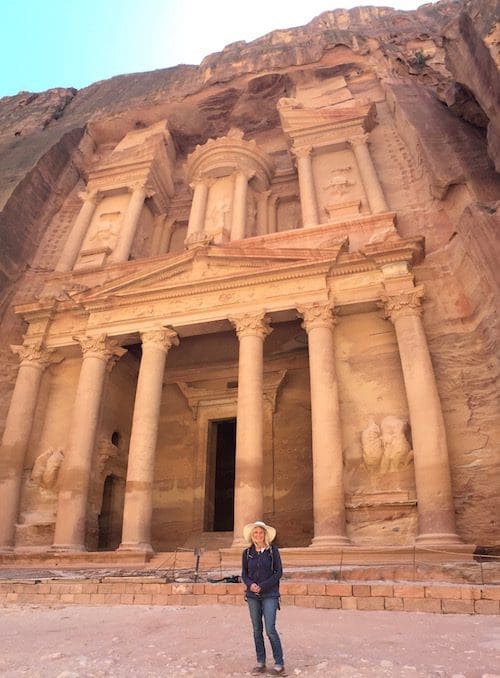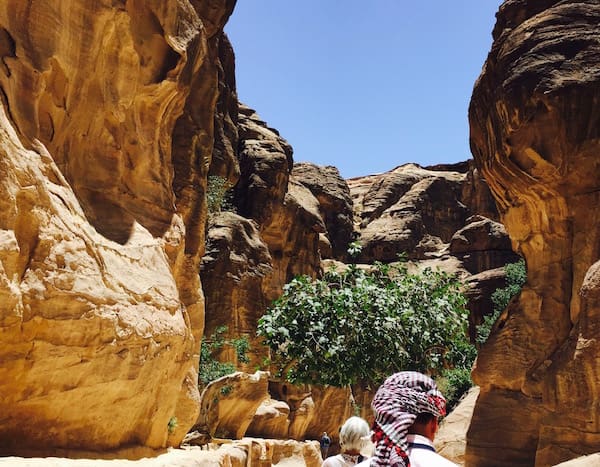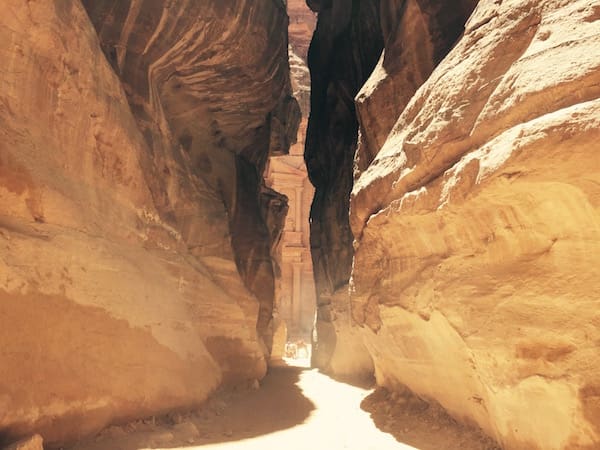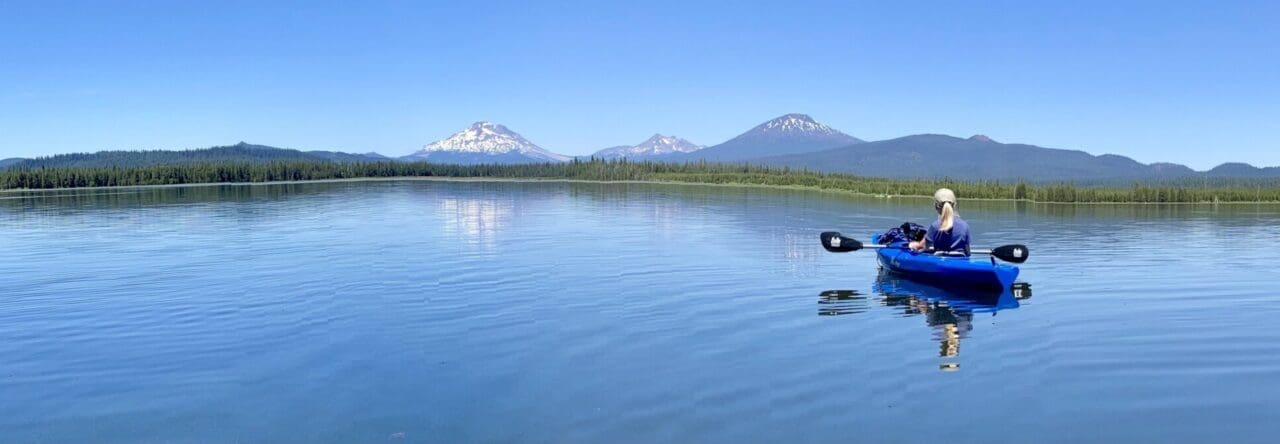While on a recent Middle Eastern adventure, my nieces and I crossed from Israel into Jordan and rode through barren wilderness to Petra, a historical and archaeological city named among the “New 7 Wonders of the World.”

The Treasury (photo: Breanna Canclini)
Petra offers unparalleled craftsmanship and astounding natural beauty in a harsh and desolate place. While trekking through the canyon, we passed occasional greenery that provided much-appreciated shade and respite.
What explains the survival of these trees? Obviously, they’ve found a water source, which means what appears on the surface has deeper roots than we can see.

When I first noticed the greenness growing out of the rocks, I commented to my adopted niece: That reminds me of Gary.
My husband, Gary, was a survivor during a wilderness season of our lives.
And by wilderness, I mean those thirteen bleak years beginning with a job lay-off and extending to two years of unemployment that included a live-in parent sinking into dementia and, just for good measure, why don’t we throw in a terminal cancer diagnosis. Those wilderness years.
It was a discouraging, fearsome, daunting season until we learned how to thrive in barren places, which meant growing our roots deep to find survival resources.
In no particular order, survival for us included the following:
Physical self-care.
Gary and I took up hiking in our middle years because the treatment he was on caused osteoporosis, and pounding the trails helped build stronger bones. We became addicted to regular outdoor physical activity, so when winter arrived, we took up snow-shoeing.
As for better eating, we simply increased our veggies, fruits, whole grains and legumes; we substituted healthful fats and sugars — olive oil, avocados, honey, molasses — for the less-healthful varieties; and when it came to meat, we ate modest portions of mostly poultry, fish and wild game.
Here’s the thing about better nutrition and increased physical activity: one without the other doesn’t quite provide the same impact that the two provide collectively.
Stress management.
Gary and I discovered several ways to manage the stress of cancer and caregiving. Simple things, like getting outdoors; and a good book or good movie, followed by energetic discussion. We established a standing Friday date night that almost always included some outdoor activity. Anyone can do dinner and a movie, right? But what about a gentle hike around a lake followed by fresh fish on the patio of the lakeside restaurant?
We practiced living in the moment instead of dwelling on what the future held for us. It’s not that our heads were buried in the sand, ostrich-style; but we knew we could do nothing about the ongoing march of cancer, and so why not enjoy this moment, the simple pleasures that make up this day, one more day together?
Gratitude.
Gary and I finally learned — after spending entirely too much time wallowing in self-pity — that we could either count all that would never be the same again, or we could count what remained after each devastating piece of news.
Even in this moment, as I write this paragraph, I’m grateful for: Sitting in the shade beneath tall trees on this gorgeous June day; taste of Chai tea; bird song; surrounded by freedom and safety and beauty; text message from friend scheduling dinner later; anticipation of a hike along Tumalo Creek this afternoon. And that’s just today.
Deepening our spiritual roots.
Our faith in God was strengthened during the wilderness years. I know that sounds counterintuitive because when things go crazy awry, we humans tend to blame God: God, how could you allow this?! And when we’re angry at God, there is no peace, no faith-strengthening, no joy.
Instead, Gary and I learned to lean into what we had no control over—side effects of financial setbacks, spread of cancer, side effects of treatment—and made the best of what we could control with gratitude lists running through our lives, trusting that the Choreographer of Life sees the bigger picture and there is purpose, even in this.
And miraculously, by leaning in and trusting—vs. complaining and kicking against—unimaginable peace became our constant companion.
Creating beauty for fellow travelers.
Gary and I intuitively knew that if we could find a way to give back, to create meaning from these hard years, then that could go far in our own survival. And so we set about creating beauty and hope and encouragement for others journeying through barren places.

For us, that meant establishing a non-profit and sharing our living-well-with-terminal-cancer message. For Gary, it meant training as a peer support volunteer; for me, it meant blogging the humorous and heart-breaking journey with the hope of encouraging others on the same path.
Gary eventually succumbed to cancer, but not until he lived much longer — much longer — than the professionals originally projected.
I think it was because he had roots that went deeper than anyone could see on the surface.
Which begs the question: What is your source for surviving wilderness living?
P.S. If you found this post inspirational or informational, please share, tweet or pin!

Roxanne
Marlys, What insight and wisdom! Thanks for sharing.
Marlys Johnson
Thank you for your kind words, Roxanne.
Robert Kimbrough (Ja)
Pastor Stan just officiated my husband’s funeral. He lost his 6 year battle with prostate cancer on 6/18. Stan introduced us to you a bit ago. I’ve been following your blog for months.
God has been with me so strongly! I am missing my sweet Bob, but able to count so many blessings. My new journey on this untraveled road has been spared many bumps. Tears are flowing, but I am very grateful my sorrow is not compounded with other issues.
Marlys Johnson
Yes, I remember meeting you, Jan. I’m so sorry for your loss, and so glad you are able to count so many blessings. Let me know if you’d like to get together over coffee/Chai tea the next time I’m in Idaho. Blessings.
Marlys Johnson
Jan, if you’d like, you can email me at: marlys@canceradventures.org
Carol Sherman
Very inspiring and encouraging- although we’re not dealing with cancer at present, there are many other issues that can cause your to feel like you’re going through a barren place. Your words and thoughts are very uplifting.
Marlys Johnson
Carol, I’ve always hoped my writing would reach beyond the cancer crowd. Thank you for your kind words!
Tami Schipper
Marlys,
Thank you for writing your blog. It has meant so much to me this last year. I know it is not the same as losing Gary but your blog has helped me so much for not only my walk of losing my mom so unexpectedly this last year but supporting my dad through his loss. God is using your blog in ways to help and encourage people in so many ways. Thank you for being so honest and open in your writings. I feel God’s peace with every blog I read.
Tami
Marlys Johnson
Tami, I can imagine what a support you’ve been for your dad, even while grieving the unexpected loss of your mom. God bless you with continued peace as you continue working your way through grief.
Jimmie Reed
Marlys,
The survival skills needed to survive the barren wasteland and the wilderness, are basically the same , no matter the cause. Whether it be cancer, spouse suddenly arrested, loss of job , or severe personal injury. Or all of the above in a very short amount of time. I agree that your blog could be used by so many not just for cancer survivors and supporters. Don’t ever limit yourself to just what you can think of…. HE has plans for us that we can’t even begin to grasp.
Marlys Johnson
“Don’t ever limit yourself to just what you can think of … HE has plans for us that we can’t even begin to grasp.” Well said, Jimmie. I hope you weren’t describing your circumstances, but if you were, my heart goes out to you and my prayers go up for you in this barren place.